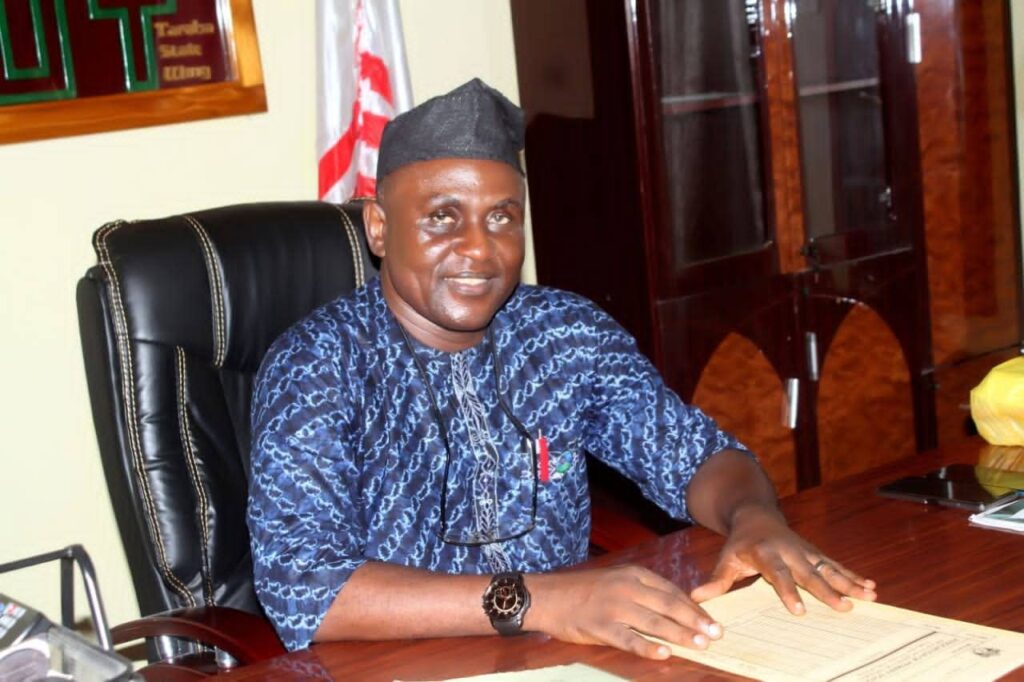Sustaining the Leadership Gains of the Nigeria Union of Teachers (NUT) Taraba State Wing: Comrade Nathan Solomon at the 11th Delegate Conference 2025.
By Raymond Enoch
When the Federal Military Government created Taraba State from the defunct Gongola State in 1991, a new identity emerged not only for the people, but also for the teaching profession. That same year, the Nigeria Union of Teachers (NUT) Taraba State Wing came into being, stepping forward as the collective voice, shield and platform for teachers across the young state.

From its inception, the union has played a pivotal role in defending teachers’ rights and empowering its members, ensuring that the men and women who stand in front of the classroom are not left behind in policy, welfare or decision-making. Over the years, it has confronted recurring challenges such as irregular salaries, unpaid arrears, poor working conditions and lack of teaching facilities, especially in rural areas. At critical moments, the union has stood between the teacher and hardship, engaging successive state governments in Jalingo to demand justice and fairness on issues of timely and regular payment of salaries and allowances, promotions with financial backing, retirement benefits, pensions and gratuities, fair deployment and transfer policies, and a safe, conducive working environment in schools.

Beyond defence, the union has worked consistently to empower teachers through advocacy for training and re-training, involvement in education policy discussions, and insistence that teachers be recognised as professionals whose voices matter in curriculum reforms and school management. In doing so, the NUT Taraba State Wing has helped to restore dignity to the teaching profession, projecting teachers as partners in development rather than expendable labour.
Every four years, the union’s Quadrennial Delegates Conference serves as the crucible in which its direction is examined and renewed. Delegates from Local Government branches and other organs of the union converge to review the activities and financial records of the outgoing State Executive Council, debate motions, adopt resolutions and elect new leaders in line with the NUT constitution. The 12th Delegates Conference in November 2025 is another defining moment, offering an opportunity for sober reflection on the union’s history, achievements and shortcomings, especially in relation to its core mandate of protecting teachers’ rights and promoting their welfare.
Under the stewardship of Comrade Nathan Solomon, the current State Executive Council has continued to deploy union structures in defence of members’ interests. There have been sustained engagements with government on prompt salary payments, regular promotions, and improved school infrastructure, with particular concern for the harsh realities teachers face in rural and hard-to-reach communities. The administration has also sought to strengthen branches and educate union leaders on how to manage disputes, grievances and negotiations, recognising that Local Government Chairmen and Secretaries are often the first line of defence when teachers’ rights are threatened.
Yet the context remains challenging. Many schools in the hinterlands still operate with inadequate facilities. Rising inflation erodes the value of salaries, putting teachers under greater financial pressure. Security concerns in some parts of the state add psychological strain to an already demanding job. New curriculum requirements and the global shift towards technology-driven education call for better training and tools if teachers are to remain effective in the classroom. All of this demands a union that is more proactive, united and strategic than ever.
As the November 2025 conference approaches, the central question for the NUT Taraba State Wing is how to consolidate and extend the gains made in defending teachers’ rights and empowerment. The union must recommit itself to stronger internal unity and discipline so that internal conflicts do not weaken its bargaining power. It must deepen engagement with government and other stakeholders, using facts, data and constructive dialogue to push for improved welfare and working conditions. Building the capacity of Local Government Branch Chairmen and Secretaries is essential, as their effectiveness at the grassroots level often determines whether teachers feel the impact of union decisions.
At the same time, the union must continue to promote professionalism and ethical conduct among its members, reinforcing the moral strength of its demands by ensuring that teachers themselves uphold punctuality, discipline and a commitment to continuous self-improvement. It must also explore welfare schemes and support systems that go beyond salaries, including health initiatives, housing support and cooperative ventures that can cushion members against economic shocks.
At this crucial juncture, there is a clear call on the union leadership – from the State Wing down to the Local Government Branch Chairmen and Secretaries – to rise to the occasion. They must close ranks, remain accessible to members, and ensure that every teacher, whether in urban Jalingo or remote Gembu, feels the union’s protective presence and empowering influence. The NUT Taraba State Wing was born in 1991 alongside the state itself; today, as it marches toward the 12th Delegates Conference in 2025 under Comrade Nathan Solomon, it carries a responsibility not only to elect officers, but to safeguard a legacy.
For the teachers of Taraba, the expectations are clear: a union that defends, a union that empowers, and a union that serves. To strengthen the union, sustain it and serve the members is no longer just a slogan; it is the duty of every leader and delegate, and the hope of every teacher who looks to the NUT as their shield, their voice and their platform for a better tomorrow.








